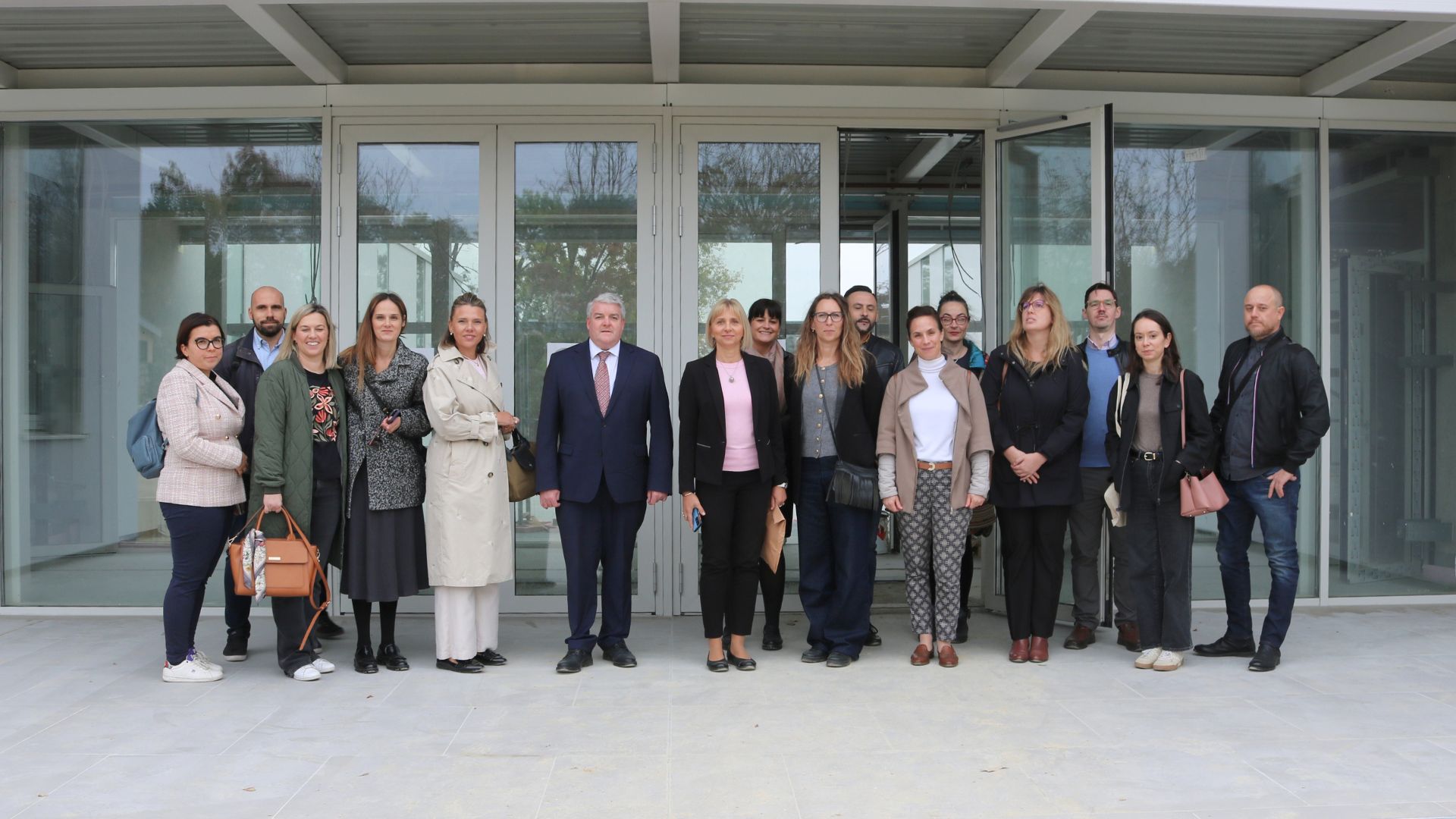The Delegation of the European Commission Commend Progress of the Infrastructure Project O-ZIP

A European Commission delegation led by Aida Liha Matejiček, Head of Unit for Cohesion Policy in Croatia and Romania, visited the Ruđer Bošković Institute (RBI) in Zagreb to assess the progress of the major infrastructure project, the Open Scientific Infrastructural Platforms for Innovative Applications in the Economy and Society (O-ZIP).
The delegation also included key representatives from Croatian ministries, such as State Secretary Zrinka Raguž from the Croatian Ministry of Regional Development and EU Funds and Ana Varjačić from the Croatian Ministry of Science, Education and Youth. Together, they toured the scientific platforms and state-of-the-art equipment that will enable RBI to position itself as a regional leader in scientific research and innovation.
The visit began with a meeting in the RBI Director's office, where Dr David M. Smith, Director of the Institute, Marko Pavić, President of the RBI Managing Board, and Dr Ivanka Jerić, Deputy Director, gave a strategic overview of the importance of the O-ZIP project for Croatian science and the European Research Area (ERA) more broadly, as well as the current status of its implementation.
Aida Liha Matejiček from the European Commission emphasised the crucial role of EU cohesion policy in strengthening scientific capacities and regional competitiveness: “Projects like O-ZIP show how science can drive innovation and economic growth. O-ZIP is one of the projects closely monitored by the European Commission and I am pleased to say that the RBI has set high standards in the management of structural projects. We hope that this will have a positive impact on the Croatian community.”
Dr David M. Smith emphasised that O-ZIP represents the first significant strategic investment in the Institute since its inception and that great efforts have been made to ensure that the Institute’s scientists have the infrastructural conditions to compete on an equal footing with their European counterparts.
‘’The RBI is already at the forefront of securing European funding, both through Horizon projects and structural initiatives. Of the nine prestigious European Research Council projects awarded to Croatian scientists, four ‘Science Oscars’ have gone to RBI researchers, underlining their excellence. The European Union sets the bar high for leading scientists, particularly in terms of the research infrastructure and resources they have at their disposal, and the O-ZIP project is laying the groundwork to attract even more top-tier scientists and projects to the RBI. We are confident this investment will pave the way for new ventures and significantly advance both science and society,” said Dr Smith.
Following the presentation, the delegation visited several key sites of the O-ZIP project. The first stop was the future BioMed Platform Centre, which will serve the needs of researchers in the fields of chemistry and molecular medicine. This facility is expected to be completed in 2025, further strengthening the institute’s capacity to develop new drugs and disease diagnostics.
The delegation also visited the Laboratory for the Biological Effects of Metals in the Department of Marine and Environmental Research, where Dr Zrinka Dragun, the head of the laboratory, presented the new equipment that will be used by scientists from the MarEnv platform, an interdisciplinary platform for marine and environmental research.
Dr Dragun demonstrated the use of a high-performance liquid chromatograph and an inductively coupled plasma mass spectrometer, important instruments for studying the effects of pollutants on ecosystems.
The delegation then visited the accelerator hall, which will house a new accelerator and a neutron generator. This infrastructure will enable scientists to conduct advanced materials research, photonics and radiation technologies and create the conditions for the development of innovative material characterisation techniques. The TechMat platform will enable Croatian scientists to compete on the European and global stage in areas that are crucial for the future development of industry and technology.
A particular highlight of the visit was the tour of the construction site of Building A1, which will house the ICST platform dedicated to research in the field of information and communication technologies. Construction work is nearing completion. Once completed, A1 will be a centre for research in the field of computer science, including cloud computing, data analysis and artificial intelligence.
The delegation concluded its visit in the Ivan Supek Wing, where Dr Maja Mičetić demonstrated the magnetron sputter thin film deposition system and Dr Hrvoje Fulgosi presented the JEOL JEM-1400Flash transmission electron microscope. State Secretary Zrinka Raguž emphasised the importance of the visit and commented: “The vision of RBI that we have seen today is proof of how strategic investments in scientific infrastructure form the basis for long-term development, not only in science, but also in the economy.”
With the ongoing support of the European Commission and Croatian ministries, the O-ZIP project is nearing its successful completion, consolidating the position of the Ruđer Bošković Institute as a centre of scientific excellence and innovation in Europe and beyond.
The O-ZIP project is financed by the European Regional Development Fund (ERDF). The Ministry of Science, Education and Youth serves as the first-level intermediary, while the Central Agency for Financing and Allocation of EU Programmes and Projects (SAFU) represents the second level.

